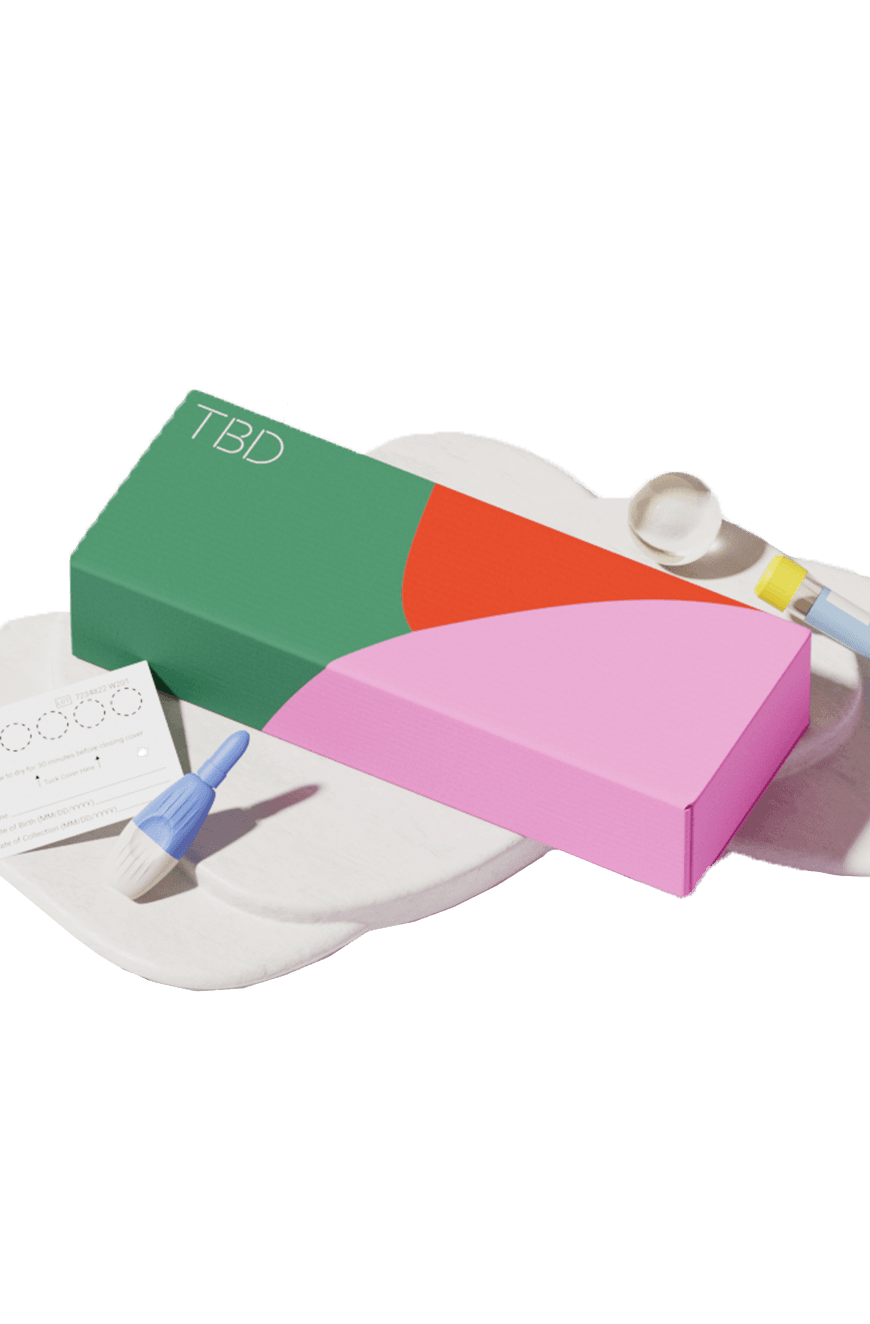| TBD Panels | 3-Panel STD Test | 9-Panel STD Test | 5-Panel STD Test | 3 Site: Oral, Rectal, Genital |
|---|---|---|---|---|
| Chlamydia |  |  |  |  |
| Gonorrhea |  |  |  |  |
| Trichomoniasis |  |  |  | |
| HIV (Ag/Ab) |  |  | ||
| Syphilis |  |  | ||
| Hepatitis B & C |  | |||
| HSV I |  | |||
| HSV II |  |

- 8 E Charleston Blvd
- Las Vegas, NV 89104
- Tues and Fri
- 10 AM – 2PM
- Contact us:
- +1 (702) 909-0554
- hello@tbd.health

| TBD Panels | 3-Panel STD Test | 9-Panel STD Test | 5-Panel STD Test | 3 Site: Oral, Rectal, Genital |
|---|---|---|---|---|
| Chlamydia |  |  |  |  |
| Gonorrhea |  |  |  |  |
| Trichomoniasis |  |  |  | |
| HIV (Ag/Ab) |  |  | ||
| Syphilis |  |  | ||
| Hepatitis B & C |  | |||
| HSV I |  | |||
| HSV II |  |

Interview with Adrienne Ton, NP and Dr. Murphy, Director of Wellness
Meet TBD's New Director of Wellness
Adrienne: Welcome! So can you go ahead and introduce yourself and tell us a little bit about your role here with TBD?
Dr. Murphy: Yes, so I am Dr. Sophia Murphy and I am the Director of Wellness, and it is my new role to build out the wellness and the whole health side of the business so we can help patients better understand all the positive and wonderful aspects of sex; whatever that means for each of them.
Adrienne: That's so great. And where are you from? Where are you based?
Dr. Murphy: Undergrad in northern Florida and then grad school in San Francisco and then grad school again in Arizona. And so now I've stayed in Arizona and I am based here in Tempe, where I also have a private practice.
Adrienne: Oh, I've been to Tempe. It's really nice!
Dr. Murphy: Yeah, it's cute. It's near the campus and the nice little hubs near everything.
Adrienne: What kind of population do you tend to work with?
Dr. Murphy: My specialty is really BIPOC LGBTQ. One of my goals of moving to a more conservative state was to create a safe space for our most disenfranchised patients. So I really see predominantly queer-identifying people who are typically black or indigenous.
Adrienne: That's really great work. How is it working in a more conservative area? Do you get any pushback there?
Dr. Murphy: Not to my face. Patients love it. And I hear a lot from patients about how they have searched and it’s a hard space to find. They're very grateful when they find our practice, whether it's working with myself or one of my clinicians. I don't ever receive the pushback that you might expect given some of the local politics.
Adrienne: In my clinical role, I see a lot of patients who ask for help, especially mental health support, with someone who can understand their gender or sexual identities. It’s hard to find good mental health, so we are excited to have you! What brought you into the field?
Dr. Murphy: I had already been a therapist for almost a decade before sex coaching and working with sexual health specifically really came on my radar. All of my background is in family systems [therapy]. So that includes like our larger systems, which is how I sort of ended up in that BIPOC Queer space. I was really helping people recognize how their gender, their gender identity, their race, their socioeconomic status, and these larger systems affect how they see themselves, how they feel about themselves, and how they cope. And so through that I started having mostly my women or female-identifying patients tiptoeing into the subject of sexuality. And that sort of put me in this position of “Well, I know logically that sex is part of mental health and well-being and I never really had any specialized training in that.” And as I go to do when I'm curious, I just like to go back to school and get some extra education. So I [searched for] certification programs and things that I could use to build upon my therapy background, and found sexology and sex coaching and I really didn't know what that meant. That sounded very exciting. And so I really got into this specific aspect of the field because I wanted to better understand how to help people address more targeted issues, separate from maybe some of the longer-term, intergenerational trauma things that I tackle in therapy. So I thought that through the wellness side and the coaching side, I have been able to really help people identify some more targeted goals. Whether it's specific thoughts or beliefs or specific behaviors that they want to change.
Learn More: What is Sex Coaching and Who Can Benefit?
Adrienne: I’m curious as to what exactly sex coaching is, how would you describe what that means? What is sexology?
Dr. Murphy: Coaching is really targeted intervention around improving one's relationship with their sexuality. So again, that could mean “I have these fantasies that I've never talked about it and I don't really know what to do with that” or how to have that conversation with a partner and really working on like, basic ideas and skills on how to ask for what do you want and how to navigate what that's gonna look like. And addressing, what does that even mean if you were to bring it to life? Examples might be that someone is in their later years, has never had an orgasm, so we're talking about, “Wow, what do you think's going on or what's been the breakdown there?” Again, oftentimes, it might be communication or common health misconceptions. So with sex coaching, I’m helping people really hone in on something specific, that they want to change with tools and support and really accountability in a much more targeted, interactive, directed way than I would ever do in therapy.
For me, therapy is much more long term. I tend to have my therapy patients for over a year, while working on deeply rooted, core belief changes, personal changes. Coaching is much more like okay, this is the thing. This is what we want it to look like, and that's how we're gonna get there.
Adrienne: Thank you. That makes a lot of sense. And I feel like when you hear the term sex coach, that's not exactly the first thing that comes to mind. I think medical clinicians are often bad at talking about sex or pleasure, which is a problem, and often only offer medications. But sex and pleasure are such huge pieces of everybody's lives that should be addressed. I’m glad that sex coaching can give people more tools to manage this.
Dr. Murphy: I always think sex coaching is a hopeful adjunct. It's just probably not gonna hit everything that's really going on.
Dr. Murphy's Goals for the Future at TBD
Adrienne: Exactly. And then what would you say are some of your goals overall for working with TBD Health?
Dr. Murphy: I’m excited to build upon what is already existing! I absolutely love the idea of opening up the conversation of STIs and STDs and de-stigmatizing it. So on one hand is that piece of normalization, while the other piece is the access to care. And I think when we have those two things together, we can shift an entire cultural understanding of the topic. And so to me, the wellness piece just lays right on top of that. So we think about, maybe “ think I’m abnormal because of this” or “I'm worried because no one ever told me about this and I have all these ideas”, or “I've seen it in a movie or pornography”, or “I heard someone make a joke about it once and I just don't know.”
So I think the last bit of information paired with stigma around sexual wellness is the issue. It’s then, ok - where do I go? Who do I talk to?
So to me, the platform that TBD has is destigmatizing plus access to care.
I want to take that exact platform and just add this to it. So now that we're talking about your physical health, how do you feel about that and what are you interested in and have you ever even thought about that? How satisfied are you with your sex life, whether that means by yourself or with somebody else? I'm excited to open up that conversation, and then just have it be easily accessible to people.
Adrienne: And in what ways, are you thinking about opening up that conversation around destigmatizing STIs and opening up the conversation about STIs/STDs?
Dr. Murphy: We have some exciting plans in the works right now and will be making announcements when those plans are ready.
Adrienne: And then how would you describe your approach to your care?
Dr. Murphy: I really think about how to help people feel safe in their bodies. I don't have a word for that other than I approach all wellness and health from that very first relationship with ourselves. I try to talk to people about being mindful without kind of overwhelming them, because that's not necessarily easy for everybody or necessarily safe-feeling. If someone hasn't felt safe, and you try to get them to meditate, they might panic. So starting to just create a space where people can talk about how they feel about themselves and within themselves. Often we have very critical messages, negative messages or comparing ourselves, especially when it comes to things like that. We focus on what it's supposed to look like or how it's supposed to work, or who it's supposed to be with. [I like to] give people just a space to consider “what do I think” and “have I ever even asked myself that” and then, “how do I feel about that?”. We focus on creating a sense of what it's like to be safe in your bodies and we can go from there.
Adrienne: Thank you for sharing that. And then generally speaking, what are some of the myths or myths that you hear a lot of patients or clients tell you when it comes to their sexual health or wellness?
Dr. Murphy: Yeah, so what's interesting - I hear this repeatedly- is this idea that sex just happens and it just works. Every time. So whether that's like, with somebody for the first time or like when people have been together for a long time, there's just this romanticized idea of like, well, because we're in the mood or like, the opportunity presents itself. Like, it just happens, and it's amazing and like, you don't have to do anything. And so when that doesn't happen that's when people tend to get really frustrated, or very critical of either themselves or somebody else. So this whole idea that it's effortless, I think actually prevents people from asking for what they want, or trying something new. Because there's this stigma that oh gosh, if we have to do something different, then are we doing it wrong? And so that's a really common one that I hear.
Adrienne: Yes, it's interesting because I think in my clinical experience, that is something that I hear echoed too when it comes to conversations around sexual health. “There's something wrong with me,” or “It should just work”. Everything should just be fine. So I will be excited to hear how you're able to kind of help folks with that too, because that’s a piece that is really needed.
What would you say is some of the best advice you've received, whether that’s related to this work or separately?
Dr. Murphy: Yeah, I was really thinking about this. That's such a great question. And the one that I really landed on was years ago, almost a decade now, I got into boxing. And the gym owner has this line and he’s just like “Yes, I can”. And so whenever we'd be tired or exhausted, he would just be like, “Yes, I can”. Repeat back. “Yes, I can.” And I actually have it tattooed on me. I joke that I look like a walking vision board or something. And so I think about that a lot. Yes, I can maybe ask that question or tell that thing to that person or take that risk or go one more round or go one more mile. I think that that's just a really helpful grounding piece of advice.
Adrienne: I like that a lot. Yes, I can! And speaking of what you have been doing for self care, sounds like boxing is one of the things that you do. What else do you do for your self care?
Dr. Murphy: Yeah, I’ve really tried to change my own relationship with my body and look at it as this amazing machine that allows me to do so many things. And so with that, I try to engage in all these different ways of moving and having experiences and see it as a point of gratitude. So I look at boxing, it's really hard. It's also really grounding, right? When you hit something, it kind of shakes you, and it wakes you up. You can't really beat that. I love to dance. I love to run. I’m the person who likes to dance with my dogs in the kitchen when I'm cooking, and I just like to try to move my body in ways that are really gratitude-based.
Adrienne: That's beautiful. Anything else that you want to share in terms of your introduction to the TBD world?
Dr. Murphy: What I hope to accomplish is I really want to expand this dialogue of sex being such a natural way of being a human. However that looks for you, or however you express that. As long as it's safe, sane and consensual, go for it.
Adrienne: Thank you for sharing with us!
This article provides information about sexual health, healthcare and/or related subjects. The blog content and any linked materials herein are not intended to be, and should not be construed as a substitute for, medical or healthcare advice, diagnosis or treatment. Any reader or person with a medical concern should consult with an appropriately-licensed physician or other healthcare provider. This blog is provided purely for informational purposes. The views expressed herein are not sponsored by and do not represent the opinions of TBD Health Inc.



Email us and a team member will get back to you within 24 hours. We’re also available via call or text at +1 (702) 909-0554
Sign up below to get 10% off
By providing my email address, I agree to receive email with marketing communications from TBD Health including news, promotions and exclusive offers. I understand that I can opt out at any time by using unsubscribe links. Visit our Terms of Service or Privacy Policy for more information.






